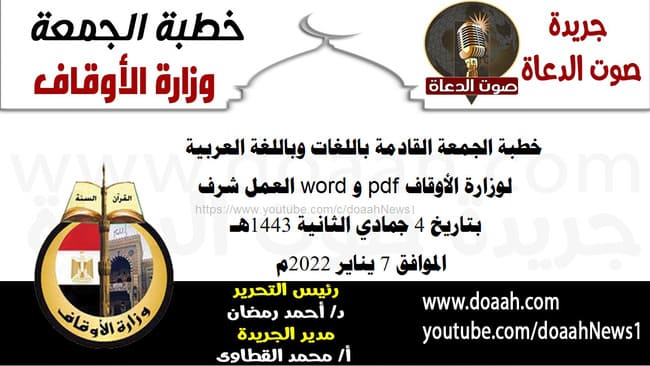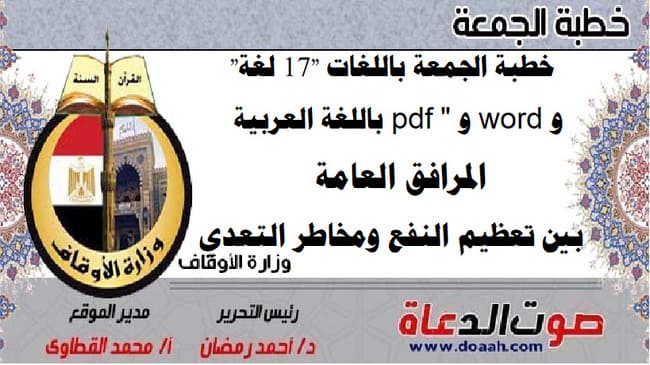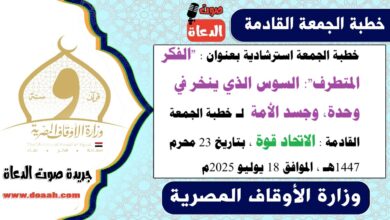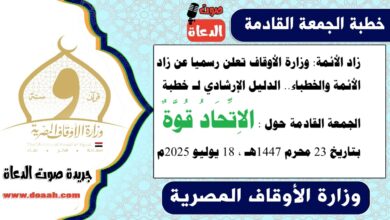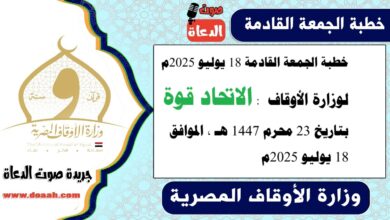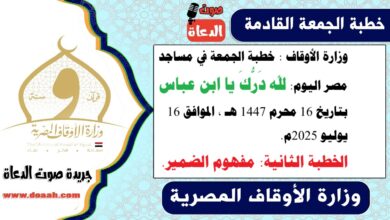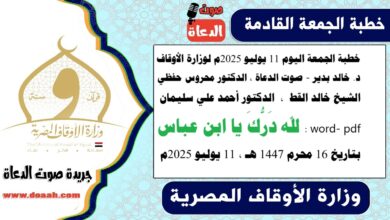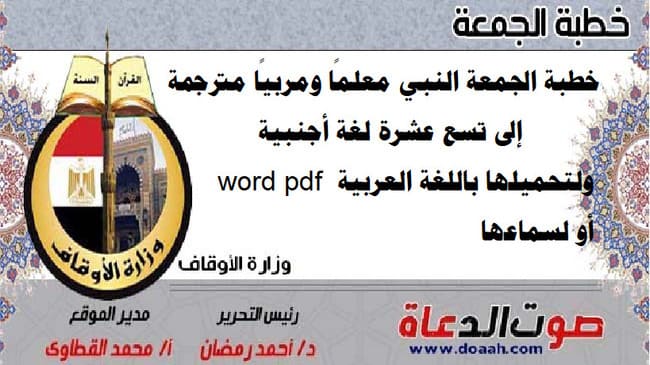Toleraance as a Belief and Practice

Toleraance as a Belief and Practice
خطبة الجمعة لوزراة الأوقاف مسموعة باللغة الإنجليزية : السماحةُ عقيدةً وسلوكًا والاصطفاف الوطني واجب الوقت ، 10 يناير 2020 م ، 15 جماد الأول 1441 هـ .
video
All praise is due to Allah, the Lord of all worlds, Who says in His Ever Glorious Book, “Allah wants ease for you, not hardship.” I bear witness that there is no god but Allah, and that Muhammad is His Servant and Messenger, who said, “I have been sent with the tolerant pure religion.” May Allah’s Peace and Blessings be upon him, his Household, Companions and upon those who follow their path to the Day of Judgment.
The Prophet (PBUH) came with a universal message that made tolerance and easiness a way of life. There is no hardship in the provisions of this religion. The Almighty Allah says, “He has chosen you and placed no hardship in your religion.” The Prophet (PBUH) said, “The religion (of Islam) is easy, and whoever makes the religion a rigour, it will overpower him. So, follow a middle course (in worship); if you can’t do this, do something near to it and give glad tidings and seek help (of Allah) at morn and at dusk and some part of night.” Thus, tolerance in Islam is not a just a spoken word or a slogan. Rather, it is a part of Muslim’s belief and should be a way of life. It is a principle that the Almighty Allah commanded His servants to embody in their dealings, and a reason to get the pleasure of Allah. The Almighty Allah says, “Let them pardon and forgive. Do you not wish that Allah should forgive you?”
However, what we seek is to make tolerance a daily-life practice because Islam’s call for tolerance is a call for to practical application. In various occasions in the Qur’an, the Almighty Allah calls upon servants to pardon each other and be tolerant. Allah says, “Good and evil cannot be equal. [Prophet], repel evil with what is better and your enemy will become as close as an old and valued friend.” The Prophet (PBUH) applied tolerance in his dealings with people. He was the best example for his nation and for all humanity. He said, “I have been sent as mercy.” Aisha said, “Whenever the Prophet (PBUH) was given an option between two things, he used to select the easier of the two as long as it was not sinful; but if it was sinful, he would remain far from it.”
We should openly ask ourselves: do we apply this practice in our life? Do we make it an approach for interacting with each other? Tolerance is a noble behavior that should be applied by the Muslim in all aspects of life. These aspects include: tolerance between the two spouses. Marital relationship is a unique relationship; it is a great gift from Allah Who showed us that it should be based on affection, mercy and good relationship. The Almighty Allah says, “Another of His signs is that He created spouses from among yourselves for you to live with in tranquility: He ordained love and kindness between you.” He –Glory be to Him- also says, “Live with them in accordance with what is fair and kind: if you dislike them, it may well be that you dislike something in which Allah has put much good.” Allah also says, “Wives have [rights] similar to their [obligations], according to what is recognized to be fair.” The Prophet (PBUH) said, “The best of you is the one who is best to his wife, and I am the best of you to my wives.” He (PBUH) used to encourage men to deal well with their wives. For example he said, “A believer must not hate (his wife) believing woman; if he dislikes one of her characteristics he will be pleased with another.” Moreover, before his (PBUH) death he said, “Treat women nicely.”
Thus, tolerance should be a mutual behavior between the two spouses, and a human law that organizes life. What beautiful words that Abu al-Darda’ said to his wife that “When you find me angry, try to please me; and when I find you angry, I will try please you.” This is a mutual relationship based on justice and forgiveness.
Tolerance with neighbors: The Almighty Allah says, “Worship Allah; join nothing with Him. Be good to your parents, to relatives, to orphans, to the needy, to neighbours near and far.” The Prophet (PBUH) said, “Jibril kept recommending treating neighbours with kindness until I thought he would assign a share of inheritance.” Another Hadith tells us that “he who believes in Allah and the Last Day should treat his neighbor with kindness.” In another Hadith, the Prophet (PBUH) said, “By Allah, he is not a believer! By Allah, he is not a believer! By Allah, he is not a believer.’ It was asked, ‘Who is that, O Messenger of Allah?’ He said, ‘One whose neighbour does not feel safe from his evil.’” Also, the Prophet (PBUH) said, “The best of companions in the sight of Allah is the one who is best to his companions, and the best of neighbours in the sight of Allah is the one who is the best of them to his neighbor.” Moreover, He (PBUH) said, “He is not a believer whose neighbour spends the night in hunger.”
In addition, tolerance should prevail among colleagues at work, universities, schools, and so on. The Glorious Qur’an stipulates rules to strengthen the relationship between all people, as the Almighty Allah says, “O humanity! Indeed, We created you from a male and a female, and made you into peoples and tribes so that you may know one another. Surely the most noble of you in the sight of Allah is the most righteous among you. Allah is truly All-Knowing, All-Aware.” The Prophet (PBUH) was the best of people with all people and with his companions, so he (PBUH) used to deal with his Companions and all people in the best of manners; he used to treat them well, visit patients, care for them, give charity to the poor, pay back debts on behave of debtors, and forgive people. The Almighty Allah said, “By an act of mercy from Allah, you [Prophet] were gentle in your dealings with them. Had you been harsh, or hard-hearted, they would have dispersed and left you. So pardon them and ask forgiveness for them. Consult with them about matters.”
As for showing tolerance in roads and transportation, man is liable to be hurt from others, especially if we take into account the fact that there are some people who might be harsh and intolerant. So, how wonderful it is to meet people’s harm with tolerance. In this regard, Allah, Most High, says, “And the servants of the Most Merciful are those who walk upon the earth easily, and when the ignorant address them [harshly], they say [words of] peace.” Prophet Muhammad (PBUH) said, “You will not enter Paradise until you believe, and you will not believe until you love one another: should I not guide you to something doing which you will love one another: spread out salutation among you.” It is also important to abide by the regulations of roads and transportation including dealing kindly with the elderly and women and seriously considering people’s feelings. Prophet Muhammad (PBUH) says, “Kindness is not to be found in anything but that it adds to its beauty and it is not withdrawn from anything but it makes it defective.”
Tolerance may also be relating to money. In truth, spending money in the Cause of Allah is a proof on one’s true belief in Allah and His Messenger. In addition, it is a clear indication that this man is upright. Spending money is a characteristic of the believers and a means to bring hearts together. It is furthermore a means to reach righteousness. Allah, the Almighty, says: “Never will you attain the good [reward] until you spend [in the way of Allah] from that which you love. And whatever you spend – indeed, Allah is All-Knowing of it.” Prophet Muhammad (PBUH) also said, “Generosity makes a person close to Allah, close to Paradise, close to the people and far from the Fire. Stinginess makes a person far from Allah, far from Paradise, far from the people and close to the Fire.”
Man should also show tolerance at times of selling, buying and repayment of debt. Prophet Muhammad (PBUH) said, “May Allah show mercy to a man who adopts a kind attitude when he sells, buys and demands for the repayment of loans.” Prophet Muhammad (PBUH) said, “The best people are the ones who are excellent in paying off debts.”
In truth, Prophet Muhammad (PBUH) used to urge people to be tolerant and lenient and to be true models of human fraternity; he (PBUH) said, “He who gives respite to someone who is in straitened circumstances, or grants him remission, Allah will shelter him in the shade of His Throne, on the Day of Resurrection, when there will be no shade except its shade” and “There was a person who used to loan money to the people and he used to say to his servant: ‘When an insolvent person comes to you, show him leniency so that Allah may forbear our faults.’ So when he met Allah (i.e., when he died), Allah forgave him.”
With that said, I ask Allah to forgive me and you
*****************************
All praise is due to Allah, Lord of the Worlds Whose Mercy and Guidance we seek; may Allah’s Peace and Blessings be upon Prophet Muhammad, his family and companions.
Muslim brothers,
One of the greatest acts of tolerance is that relating to good word. In this regard, Allah, Most High, says, “and say good to people” and “And tell My servants to say that which is best.” One should speak good with all people, irrespective of their colors, race or beliefs. It is actually a conclusive proof on one’s good manner. It is said, “Good manner is an easy matter; it is but a face with a wide smile and lenient speech.”
Allah, Most High, ordered Prophet Moses to say gentle speech with Pharaoh who was very arrogant. Allah says: “Go, both of you, to Pharaoh. Indeed, he has transgressed. (43) And speak to him with gentle speech that perhaps he may be reminded or fear [Allah].” In the same connection, we should keep away from all forms of ill speech; Allah, the Almighty, says: “And they who turn away from ill speech”; “O you who have believed, fear Allah and speak words of appropriate justice” and ” Have you not considered how Allah presents an example, [making] a good word like a good tree, whose root is firmly fixed and its branches [high] in the sky? It produces its fruit all the time, by permission of its Lord. And Allah presents examples for the people that perhaps they will be reminded.” In the same vein, Prophet Muhammad (PBUH) said, “A slave (of Allah) may utter a word which pleases Allah without giving it much importance, and because of that Allah will raise him to degrees (of reward): a slave (of Allah) may utter a word (carelessly) which displeases Allah without thinking of its gravity and because of that he will be thrown into the Hell-Fire.” Muslims should furthermore keep away from all kinds of indecency in speech as Prophet Muhammad (PBUH) said, “A true believer is not involved in taunting, or frequently cursing (others) or in indecency or abusing.”
Tolerance stands on the middle between extremism and negligence – both are far away from the middle course of Islam that is tolerant, kind and lenient.
O Allah! Grants us tolerance in all our sayings, deeds and affairs! O Allah! Reconcile between us and protect our country and all of the world’s countries.
_____________________________
للإطلاع علي قسم خطبة الجمعة باللغات
للإطلاع ومتابعة قسم خطبة الأسبوع
للمزيد عن أسئلة امتحانات وزارة الأوقاف


